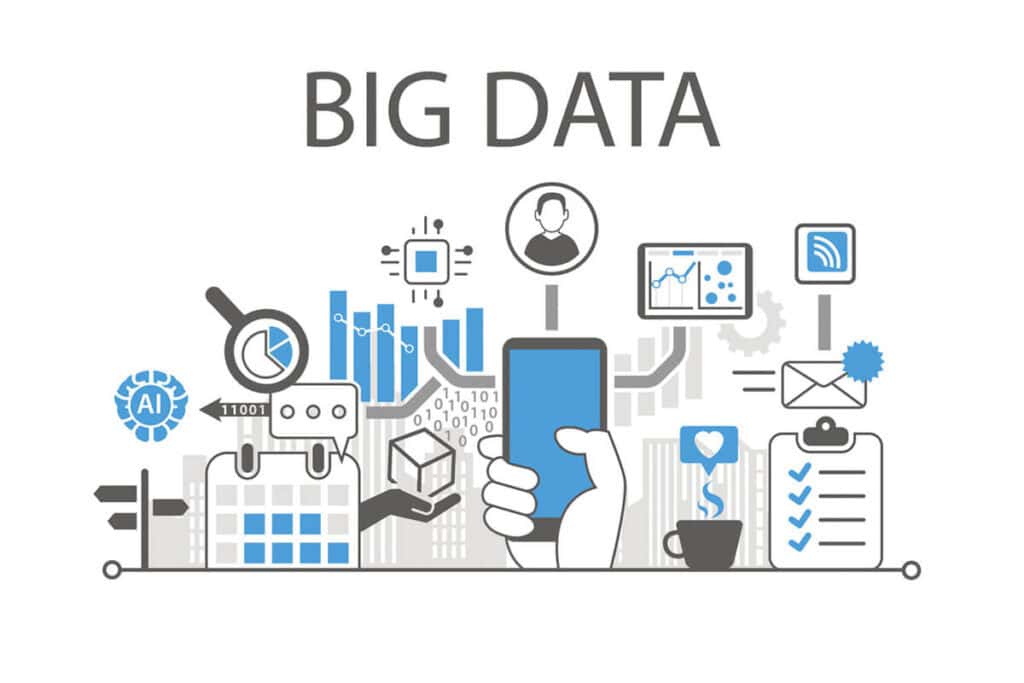Key Highlights
- Big data offers valuable insights and can transform various aspects of our lives.
- The potential benefits of big data include better decision-making, enhanced productivity, and personalized experiences.
- These are some dangers of big data: data breaches, ethical dilemmas, and the potential for abuse.
- To mitigate these risks, organizations need to prioritize data security, adhere to privacy regulations, and implement ethical data practices.
- Big data analytics should be used responsibly and transparently, with a focus on protecting individual privacy and promoting fairness.
- Despite the risks, big data has the potential to drive innovation, improve healthcare outcomes, and contribute to environmental solutions.
- It’s crucial to strike a balance between harnessing the power of big data and addressing the social and ethical implications it presents.
Table of Contents
ToggleIntroduction
Big data, a term coined in 2005, refers to vast amounts of information that challenge traditional analysis methods. It plays an important role in various sectors, providing insights and driving innovation. However, big data also poses risks from data breaches, raises privacy concerns, and creates potential ethical dilemmas. This article delves into the security issues, ethical implications, and consequences of big data misuse. Strategies to address these challenges and ensure ethical data use will also be covered.

What is Big Data and How Has It Grown?
To understand big data’s risks, we must first define it: large amounts of data from sources like operational systems, social media and sensors. It’s characterized by volume, velocity, and variety—large amounts, high speeds, and diverse formats. Analysis reveals patterns for decisions and customer experiences.
Technological advancements and digitization of business services have made data collection easier and cheaper, leading to its growth. Data science extracts insights from big data for more informed decision making. The tech industry’s big data growth is fueled by the internet of things using IoT devices generating vast amounts of valuable data to support business decisions.
The rise of social media and online activities has led to the expansion of big data. Every interaction, post, and click produces valuable insights into user behavior and preferences. Businesses use this data to personalize offerings and improve customer experiences.
With the increasing volume of data, managing and analyzing it all poses significant challenges. Advanced technologies and techniques are necessary to extract meaningful insights from these vast and complex datasets. Data scientists, data engineers and analysts are instrumental in deciphering big data for different industries, such as financial services transformation.

The Dark Side and Danger of Big Data
Big data has many benefits but also comes with risks like security, ethics, abuse by malevolent players, and unintentional misuse. These challenges affect organizations and individuals. From data breaches to manipulation through fake news, addressing these dangers is crucial.
At a personal level, I find myself increasingly skeptical of news sources, I question what I read in social media, I am more suspicious of contacts and limit the number of loyalty schemes I sign up for. Being a marketer I know how easy it is for marketing partners such as video sharing platforms to build their own lists of customers who have consumed your content. Every organization you interact with wants to retain data about you, so its important to be judicious about how much you share.
Privacy Concerns Amidst Data Collection
One of the primary concerns with big data is the potential invasion of privacy. As data collection becomes more pervasive, individuals are increasingly aware of the amount of personal information being gathered and used without their explicit consent. Privacy regulations, such as the General Data Protection Regulation (GDPR) in the European Union, have been put in place to protect individuals’ privacy rights and set standards for data security. However, there are still instances where sensitive data is collected without proper consent or stored insecurely, leaving individuals vulnerable to breaches and misuse of their personal information. Striking a balance between data collection for legitimate purposes and respecting individuals’ privacy rights is essential to maintain trust and ensure the responsible use of big data.
The Threat to Individual Security
Alongside privacy concerns, big data also poses threats to individual security. The increasing amount of data being collected and stored provides a wider attack surface for cybercriminals to exploit. Unauthorized access to sensitive customer information, such as financial data or personal identifiers, can lead to identity theft, financial fraud, or other malicious activities such as scamming. Organizations that collect and store large amounts of data must implement robust security measures to protect it against security risks. This includes encryption, secure data storage, regular security audits, and employee training on cybersecurity best practices. Individuals should also take steps to protect their own data, such as using strong passwords, enabling two-factor authentication, and being cautious about sharing personal information online or over the phone.
Ethical Dilemmas in the Age of Big Data
In addition to the security and privacy risks, big data also presents ethical dilemmas. The collection and analysis of large-scale data raise questions about consent, transparency, fairness, and the potential for discrimination. Organizations must navigate these ethical challenges to ensure that their data practices are aligned with societal values and respect individual rights. Ethical guidelines and frameworks, along with proper governance and oversight, can help address these dilemmas and promote responsible data use and data analysis. In the following sections, we will explore two key ethical dilemmas in the age of big data: manipulation of information and public opinion by malevolent players, such as organized crime, and discrimination and bias in data algorithms.

Manipulation of Information and Public Opinion
One of the ethical dilemmas associated with big data is the manipulation of information and public opinion. The vast amount of data available allows for targeted advertising, personalized content, and strategic dissemination of information. While this can enhance user experiences and improve marketing effectiveness, it also raises concerns about the autonomy of decision-making and the potential for manipulation by corporations, governments, or other entities, including insurance companies. The spread of fake news, fueled by big data analytics, can shape individuals’ choices, preferences, and beliefs, influencing public opinion on a large scale. Addressing this dilemma requires transparency, accountability, and responsible use of data to ensure that individuals have access to accurate and unbiased information.
Discrimination and Bias in Data Algorithms
Another ethical dilemma in the age of big data is the potential for discrimination and bias in data algorithms. Machine learning algorithms, which are often used to analyze big data, learn from historical data to make predictions and decisions. However, if the historical data is biased or reflects societal prejudices, the algorithms can perpetuate and amplify these biases. This can lead to unfair outcomes and discriminatory practices in areas like employment, lending, and law enforcement. To address this dilemma, organizations must be aware of the potential biases in their algorithms, use diverse and representative data sets, and regularly audit and evaluate the performance of their algorithms to ensure fairness and equity. Machine learning algorithms can be supervised by humans, who can correct bias over time.

The Consequences of Data Breaches and the Danger of Big Data
Data breaches have serious consequences for businesses and individuals. They can result in financial loss, reputational damage, and loss of trust. Organizations may face legal repercussions like fines or lawsuits for failing to protect customer data. Individuals may suffer from identity theft, fraud, or other cybercrimes. Implementing strong data security measures, auditing systems regularly, and complying with data protection regulations are crucial to safeguarding sensitive information.
Impact on Businesses and Consumers
Data breaches can have far-reaching impacts on both businesses and consumers. For businesses, the loss or theft of sensitive data can result in financial losses, reputational damage, and a decline in customer trust. The costs of investigating and remediating a data breach can be substantial, affecting a company’s bottom line. In some cases, businesses may struggle to recover from the reputational damage caused by a data breach, leading to a loss of customers and reduced business growth.
For consumers, data breaches can result in financial fraud, identity theft, and other forms of cybercrime. The compromised data can be used to impersonate individuals, open fraudulent accounts, or carry out targeted phishing attacks. Concerns have also been raised about how credit card companies are using personal details to set rates and limits, leading to potential misuse of personal information. Consumers may also experience a loss of trust in the organizations responsible for protecting their data, such as credit card companies, leading to a reluctance to share personal information and engage in online transactions. The impact of data breaches on businesses and consumers emphasizes the need for robust data security measures and proactive measures to protect sensitive information.

Overcoming the Challenges of Big Data
Despite the risks, big data can be harnessed for positive change by implementing strict security measures, ensuring transparency and user control, and addressing potential risks. We will delve into these strategies further to guide businesses and individuals on the ethical use of big data.
Implementing Stringent Data Security Measures
Implementing stringent data security measures is crucial to protect against the risks of big data. Organizations should invest in cybersecurity measures such as encryption, secure data storage solutions, and access controls to prevent unauthorized access to sensitive data. Regular security audits and vulnerability assessments can help identify and address potential vulnerabilities in data storage and processing systems. Employee training on cybersecurity best practices is also essential to create a culture of data security within organizations. By taking proactive measures to secure data, organizations can reduce the risk of data breaches and protect critical data and sensitive information.
Promoting Transparency and User Control
Promoting transparency and user control is another important aspect of mitigating the risks of big data. Organizations should be transparent about their data collection and usage practices, providing clear information to users about what data is being collected, for what purpose, and how it is being used or shared. User consent should be obtained for data collection and processing, and individuals should be provided with options to control their personal information, including the ability to access, correct, or delete their data. By empowering users with transparency and control over their data, organizations can build trust and ensure that data is used responsibly and in compliance with privacy regulations.
Conclusion
The implications of Big Data encompass privacy concerns, security threats, ethical dilemmas, and the potential consequences of data breaches. As data collection grows we need to consider the associated challenges by implementing stringent data security measures and promoting transparency and access control. By understanding the ethical dimensions and societal impacts of Big Data, we can strive towards a future where data-driven decisions are made responsibly and ethically. Stay informed, vigilant, and proactive in safeguarding data privacy and integrity in the digital age.

Frequently Asked Questions
How Can Individuals Protect Their Data Online?
Individuals can protect their data online by following security best practices such as using strong passwords, enabling two-factor authentication, and being cautious about sharing personal information. In the era of big data, it is essential to be aware of the danger of big data, ensuring that personal data is only provided to trusted sources. Additionally, regularly updating software and devices with the latest security patches, and avoiding clicking on suspicious links or downloading files from unknown sources are crucial steps.
What Are the Legal Frameworks Governing Data Privacy?
Data privacy is governed by various legal frameworks, including the General Data Protection Regulation (GDPR) in the European Union, the California Consumer Privacy Act (CCPA) in the United States, and other data protection laws in different countries. Government agencies, such as the Federal Trade Commission (FTC) in the United States, play a role in enforcing these regulations and ensuring compliance with data privacy laws.
How Will Big Data Evolve in the Next Decade?
Big data is expected to continue evolving in the next decade, driven by advancements in predictive analytics, artificial intelligence, and data analytics technologies. The increasing availability of data and the growing demand for data-driven insights are likely to shape the future of big data. Market trends indicate that organizations will further integrate big data analytics into their operations to gain competitive advantages and drive innovation.






